As an expert study coach, “how to stop procrastinating” (and start studying again!) is one of the topics I get asked about the most. Because, let’s face it, procrastination affects everyone, not just students!
So let’s break the procrastination cycle and get you back to your studies today: with 6 actionable strategies from the psychology of procrastination to help you get back on track!
Sounds perfect, right? So let’s get stuck in!
By William Wadsworth, the Cambridge University trained cognitive psychologist and specialist in how to study smarter, not harder. He leads the world’s largest research study on use of effective learning strategies, is regular exam prep expert for The Times, and hosts the Exam Study Expert podcast, with 1 million downloads to date.
Additional research, graphics and article review by Dr Kerri-Anne Edinburgh
Our mission is to provide helpful content to support students in managing their academic journeys. To ensure our articles are high quality, we follow a rigorous editorial process throughout, from research to editing. To learn more, please see our Editorial Policy.
Plus, if you’re looking for some daily anti-procrastination inspiration, why not check out our collection of empowering quotes about procrastination? They’re perfect for sticking up on your wall for a regular reminder.
Prefer to listen? You can! Simply press play, right here:
What causes procrastination?
This might seem like a tricky question.
Procrastination is all about putting of tasks until the last minute, and those of us who procrastinate heavily tend to do it for everything from finishing assignments to doing our chores …
But the answer to “what causes procrastination?” can actually be explained quite simply, by exploring the kinds of tasks that we most often procrastinate on.
These characteristic causes of procrastination have been studied in depth by Dr Tim Pychyl, author of Solving the Procrastination Puzzle and founder of the Procrastination Research Group. His research indicates that the tasks we’re most likely to procrastinate on typically have one (or more!) of the following six characteristics:
- Unstructured
- Difficult
- Frustrating
- Boring
- Lack meaning (doesn’t mean a lot to you personally)
- Lack intrinsic reward (not rewarding to work on: not fun!)
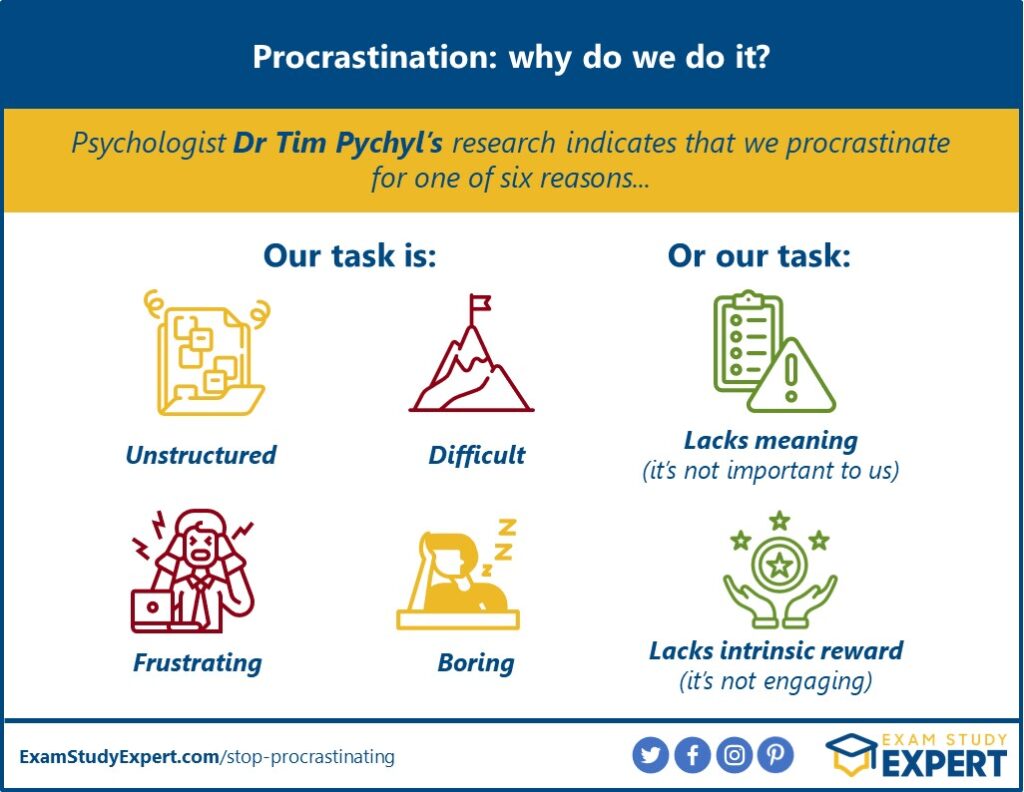
And of course, sometimes your task might tick all of these boxes:
In my own personal experience as a university student, I found revising maths and physics particularly challenging. Before I majored in psychology, I typically found maths and physics work quite unstructured, very difficult and certainly very frustrating because I wasn’t making much progress on it! And because I wasn’t making much progress, I found these subjects lacked intrinsic reward, they weren’t fun or satisfying. So … there was certainly some procrastination involved!
Another great example is big written assignments (think dissertation, or PhD thesis!) which are by nature very unstructured, difficult, frustrating and challenging. This kind of studying is often a prime procrastination trigger because it ticks so many boxes, and it’s hard to see the progress you’re making whilst running lab experiments or sorting mountains of data (also a pretty tedious task).
So, no matter what stage of academia we’re at, these characteristics can often (and easily) apply to our work!
Breaking it down: the two themes of procrastination
I’ll be honest, I find six characteristics a lot to work with.
So I’ve grouped Dr Pychyl’s characteristics into two overarching categories that will ensure the actionable strategies below best fit your procrastination situation:
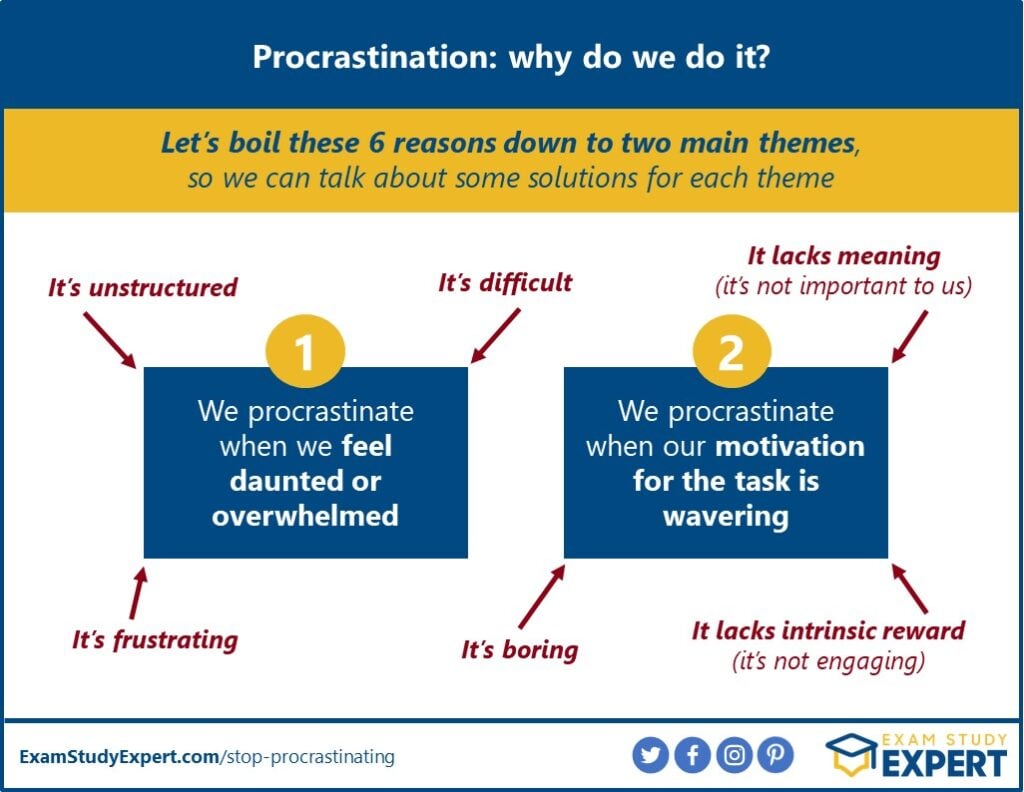
The first theme is that we procrastinate when we feel daunted or overwhelmed by a task that is unstructured, difficult or frustrating.
The second theme is that we procrastinate when our motivation for our task is wavering, which particularly strikes when a task is boring, lacks meaning or lacks intrinsic reward.
Which of these categories do you (most regularly) fall into? Let us know in the comments below!
Before I tackle my six top practical strategies to help you stop procrastinating and start studying again (helpfully divided by theme, too!), let’s take a small detour and get serious whilst we consider …
The consequences of procrastination
Whilst you might think that the little bit of procrastination you do (a browse of social media here, just one more episode of your favourite show there) isn’t all that bad … there can be serious consequences to procrastination. Especially when it becomes difficult to stop until it’s just too late!
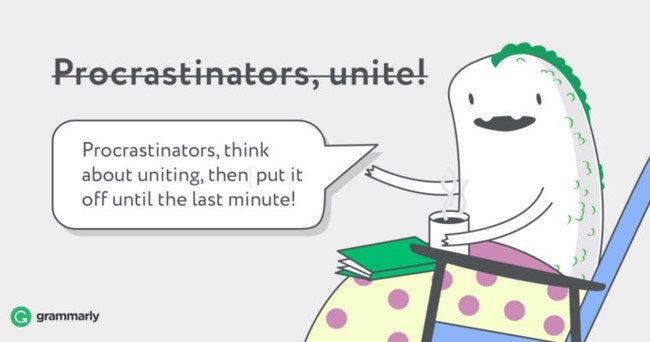
So let’s talk about, and face up to, those consequences. Come on, it’s a safe and non-judgemental space here!
Constant procrastination can lead to:
- Decreased academic (or job) performance
- Leading to struggles with assignments, lower grades, and course drop-outs
- Increased issues in your relationships
- With peers/colleagues, friends and family, and partners
- Declining mental and physical health
- Guilt, shame, frustration, stress, anxiety, depression, fatigue …
- Financial struggles
- Especially if you procrastinate at work or make risky financial decisions
- Missed opportunities
- From relationships to scholarships
- Reduced well-being overall
- Such aslow self-esteem and confidence, lack of sleep, and more …
And the bad news is that many of these issues are interconnected, and often occur together or worsen each other in a vicious cycle that can lead to serious problems – like dropping out of college!
For example, consider the mounting stress that looming deadlines can produce. We all know that stress isn’t good for our mental or physical health, or relationships with our families, friends and partners.
On the plus side, being aware of these consequences is a great way to face up to your procrastinating and help yourself (and others) when you find yourself slipping into a cycle of procrastination!
And then, the perfect next step is to tackle one of my 6 top actionable strategies for overcoming procrastination:
How to stop procrastinating and start studying: 6 actionable strategies
And here we are, the bit you’ve all been waiting for: how to stop procrastinating and start studying again (just in time to get that assignment done)!
Remember those two overarching themes of reasons why we procrastinate, above?
(Here’s a quick reminder: we procrastinate when we feel daunted or overwhelmed by our task OR we procrastinate when our motivation for our task is wavering.)
Well, these six strategies are specially formulated to target these two specific themes – all you need to do is recognise which theme best applies to your procrastination behaviours, and try out the relevant strategies!
And in the spirit of fairness, I’ve created three practical activities for each theme 😊
Top tip: Not sure which theme best applies to you? Try tracking your procrastination for a week by keeping a note of when you procrastinate, and from which tasks. Then consider what you don’t like about these tasks: which characteristics best apply?
Strategies to help you when your task is overwhelming or daunting
When you’re feeling daunted, the best way to overcome that feeling is to take action, get started, and prove that it’s not as scary as you think.
So let’s get straight to it and overcome that procrastination!
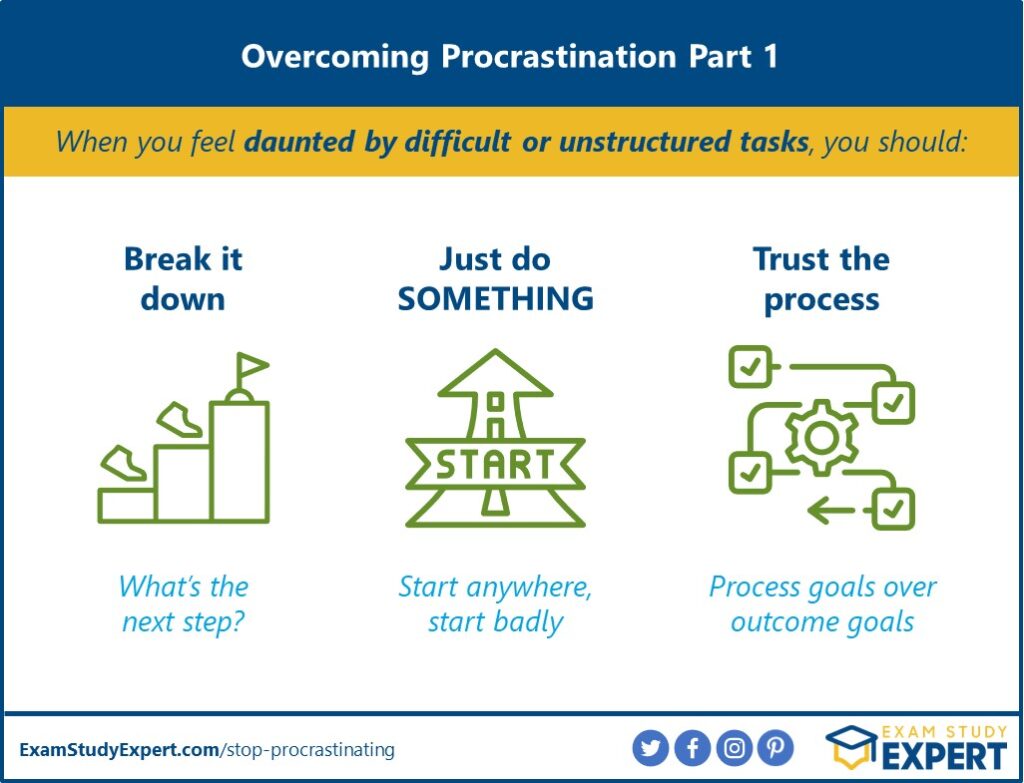
1. Break it down
So you’re procrastinating because your task is difficult and you’re feeling daunted.
Let’s take that task and break it down.
Think about what the next step is that you can take. Don’t worry about the big picture, the dissertation due, the long revision season ahead of you … just think about that next step.
Break it down into something manageable right now. Pick a little corner of your writing project, or one little sub-topic you can tackle today to feel like you’ve made at least a little bit of progress.
And then sit down for 20 minutes, or 40 minutes, or an hour and just take that next step. Trust me, you’ll feel so much better when you’ve done it and it’s out of the way!
The magic of this approach is that if we can stack enough of these “next steps” in a row, if we keep putting one foot in front of the other, we gradually make some real and tangible progress towards our goals.
2. Just do SOMETHING
This strategy is all about starting anywhere, just doing something and getting the ball rolling, even if it’s not your best work to start with.
This is particularly helpful for the kind of writing tasks that often lead to procrastination.
Many of you probably have high standards for yourself and find the idea of writing something terrible pretty impossible. But sometimes those high standards can block you from getting anything done in the first place.
So challenge yourself: write something and don’t even worry if it’s a really scrappy first draft or just a pile of rough notes. We’re not looking for quality here – we’re looking for ACTION.
Don’t worry if your sentences are incomplete, or the content is wrong, or it makes no sense at all, because that’s the beauty of editing! You can tidy up the syntax and grammar and sentences later. But you can’t do the editing unless you’ve got a scrappy draft to work from.
So step out of your comfort zone and just write.
This also works well for studying too, especially with subjects you’re new to. I mentioned above that I struggled with maths before I specialized in psychology: this was a technique I used to overcome my maths procrastination.
The first time you tackle a new subject, you might not make sense of it, and that’s OK. But perhaps your goal with this strategy is just to get stuck on it for a little while. Just start doing something with those equations, even if you can’t solve them. By trying in the first place, you can get familiar with them, and they will be far less daunting next time.
And as an added bonus, this method really teaches you to be patient with yourself!
3. Trust the process
That idea of patience feeds nicely into this third strategy: trust the process.
I love this practical strategy for overcoming procrastination and starting to study again, because it makes sure that we emphasise process goals over outcome goals. Which is really liberating, trust me!
So what are process goals and outcome goals?
Well, let me give you some examples of how they contrast:
| Process Goals | Outcome Goals |
|---|---|
| Work on my maths revision for one hour every day this week | Master a whole topic in my maths textbook by Friday |
| Work on my dissertation or assignment for two hours today | Write 1000 words for my dissertation or assignment today |
| Train for the race by running half an hour every day | Come first in the race on Saturday |
Can you see the difference?
A process goal is about the process you take. It’s something totally within your control, and often about time.
In contrast, with an outcome goal, it’s all about the end result: the number of words you write, the grade you get or the place you come in the race. And you can’t directly control an outcome goal, only influence it.
In fact, you can give yourself a better chance of achieving your outcome goals by putting realistic process goals into place to support it.
So, what has all this got to do with my third strategy for overcoming procrastination? Well, I want you to forget about the outcomes, and just focus on the processes.
Set yourself some process goals and trust that they will help you to make progress. Process goals are in your control, and that makes them much easier to tackle, much less daunting and overwhelming, on a day-to-day basis!
So pick a small, manageable process goal, and set to work banishing your procrastination for just that hour (for now!).
Strategies for when your motivation for your task is wavering
Three down, three to go – have you found a strategy that works for you yet? If not, these might be the ones for you!
Lacking in motivation is a very different root cause for procrastination that feeling daunted. It’s not about struggling to start but struggling to find purpose.
So, these next three practical activities are all about subverting that motivational struggle!
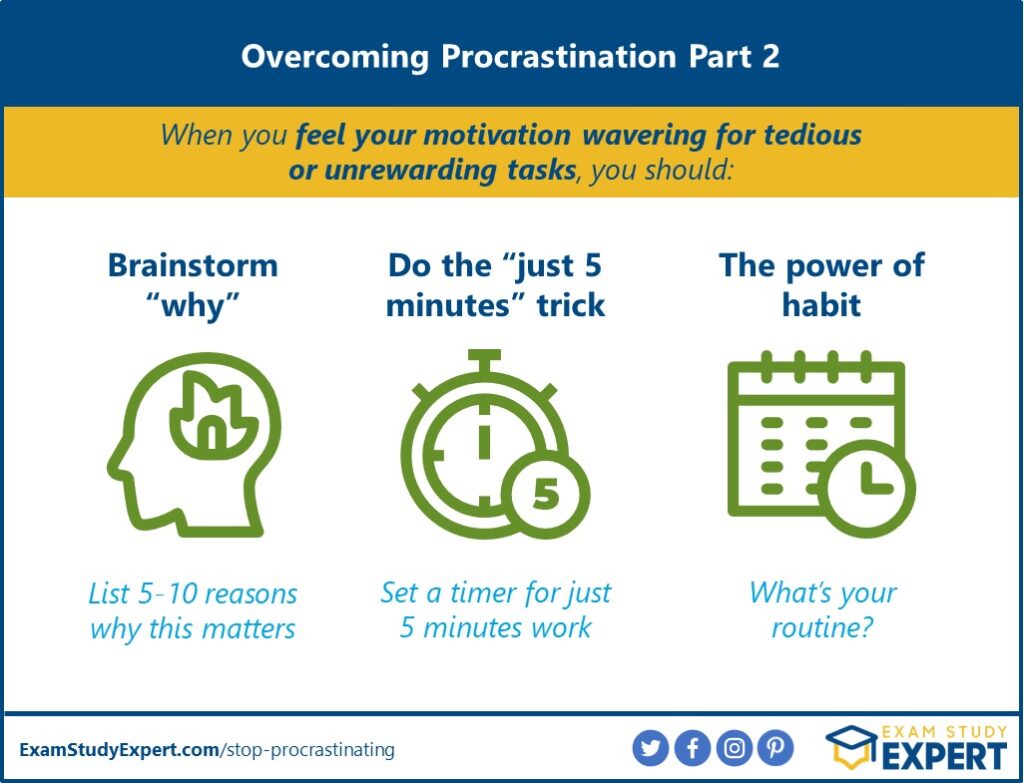
4. Brainstorm your “why”
This is a favourite motivational strategy of mine that’s perfect for stopping procrastination and starting to study again. It’s called the “why” brainstorm.
And it’s really simple to do (which is great!):
Simply take a blank sheet of paper, and give yourself 5 to 10 minutes to write down as many reasons why this matters to you as possible. Aim for at least 5-10 reasons if you can.
This can be quite a hard activity to do, especially the first time.
So here’s an example to help you understand:
You’re procrastinating on your Spanish revision, because you don’t find Spanish has meaning or intrinsic reward for you. It’s boring. So what are your “whys”?
- Perhaps you need to pass this exam: why?
- Maybe it’s because you need to get a certain grade: why?
- So that you can get a place at your college of choice, which has entrance requirements.
Great, that’s three solid reasons why for your “why” brainstorm already! But when you start to dig beyond the obvious reasons, it can get a little harder.
Stick with it though, this is the point of the exercise: to flush out those trickier to think about reasons. It’s part of why the exercise works: because you uncover new reasons to help you care and fuel your motivational fires.
Some examples could be:
- What can I learn from studying for this exam?
- What about valuable new character traits? Such as perseverance, self-discipline, how to overcome challenges, how to engage with things that you find hard at first?
- These are all important skills! And even better you can then ask:
- What other areas of my life will these skills be useful in?
- Such as exercise, team activities, or your future career
- Is this revision going to teach me new things about Spanish that could be useful in my life or career?
- Languages are a great example of this: being able to speak a foreign language when you visit that country or interact with colleagues who speak that language, that’s a huge boost!
And these reasons are all fantastic for your self-esteem, which is incredible for your motivation to stop procrastinating, pick up your pen and start studying that Spanish vocab again!
5. Do the “just five minutes” trick
This is a really popular motivational study trick to get the ball rolling and overcome that urge to procrastinate. And it’s so simple:
You set a timer for five minutes, sit down and do just five minutes of work.
And the deal that you make with yourself is this: when the five minutes is up, I’m allowed to stop. BUT if I feel like carrying on, I can carry on.
And you see where this takes you!
How does it work? Well, even when we really don’t feel like working, most people can get over the idea of sitting down and doing boring, tedious task for just five minutes. Once those five minutes are up, most of us think, “well, I’ve already started, might as well do another 10 minutes … and then another 15 minutes to round it up to half an hour: that’s a real achievement today!”.
So the magic of this method is that those first five minutes are often the hardest by far, and once the ball is rolling and the page is no longer blank … well, hello motivation to continue!
Here’s a bonus tip: if you like this strategy, you should consider studying with the Pomodoro Technique. It works very similarly: you set a timer for a whole block of work, 30 or 40 minutes. BUT you’re not allowed to keep working when the timer rings, you have to take a break before your next block.
You can learn more about the Pomodoro Technique in my Pomodoro masterclass article or in episode 59 of the Exam Study Expert podcast.
Why do these methods work? It’s all about the ticking timer, which really helps to give you energy and focus when you’re studying.
6. The power of habit
And finally, for my last top strategy to help you stop procrastinating and start studying again: the power of habit!
This is all about setting up a clear, consistent study routine that you follow each and every day, day in day out. No excuses!
And yes, the first few days of your new routine will feel quite challenging, but it is more than worth sticking to it.
Why?
Because once you get past that hurdle and over the hump, your routine will start to feel automatic as you build up the habit of “this is when I work, and this is when I rest”.
So you no longer need to spend the whole day negotiating with yourself and making decisions about when it’s time to start studying, it’s just second nature. And trust me, that feels like a huge weight off your shoulders when it comes to finding the motivation to study.
(For those of you who are college students or working, and struggle with procrastination overcoming your unstructured days, think of it a little like a return to the timetable of school – no decisions needed, just show up!)
Want to learn more about building the perfect study routine (and making sure you prioritise good habits)? Check out my ultimate study routine secrets article or tune in to episode 30 of the Exam Study Expert podcast.
Let’s get back to work!
So we’ve collected all six of my top practical strategies to help you stop procrastinating and start studying again today!
Here’s a quick recap of those six strategies:
- If you’re procrastinating because your task is daunting and overwhelming:
- Break it down and take the next step
- Just start anywhere and do SOMETHING
- Focus on your process goals
- And if you’re procrastinating because your motivation is wavering:
- Brainstorm why it matters to you
- Try the “just five minutes” trick
- And set yourself up a study routine
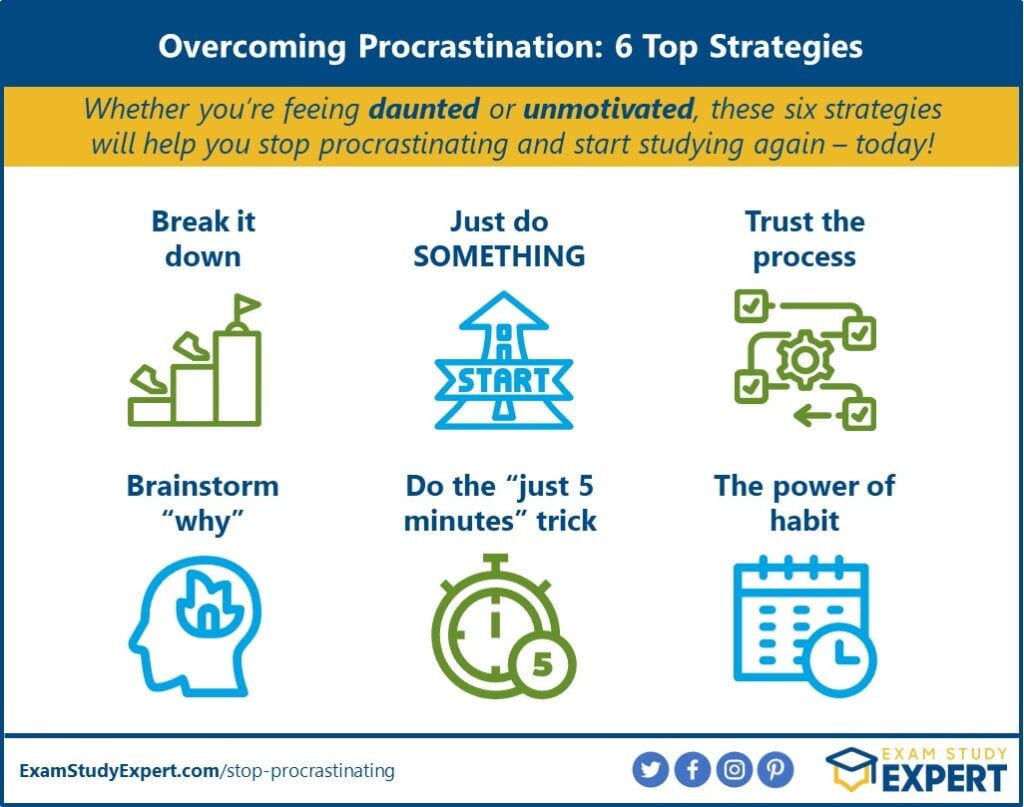
Now I’ll be honest, If I know you, reading this article has probably been a form of procrastination. But at least you can feel confident that it’s been useful, and set you up with the tools you need to stop your cycle of procrastinating and start studying again.
So good luck as you head back to your revision and assignments!
Next steps:
If you’re not quite ready to head off yet, why not browse our collections of empowering quotes about overcoming procrastination and making progress? They’re perfect for sticking up on your wall for daily motivation and inspiration to keep studying!
We’d love to know what you think: leave a comment if you’ve tried these tips and found them useful!
And if you’re looking for more top hacks and tips to help you study smarter and supercharge your grades, sign up below for my science-backed handy exam success cheat sheet below:

By William Wadsworth, the Cambridge University trained cognitive psychologist and specialist in how to study smarter, not harder. He leads the world’s largest research study on use of effective learning strategies, is regular exam prep expert for The Times, and hosts the Exam Study Expert podcast, which has 1 million downloads to date.
Author Profile | About Us | Editorial Policy | Contact Us



Thoughs strategies are really great. I just want to give it a try. Now I found my tools to stop procrastination.
Thanks Harsha, and good luck overcoming your procrastination!
Wow!!! this will greatly help me,,, thank you
Thanks, man. This is what I needed.
Cheers Lucio – you’ve got this!